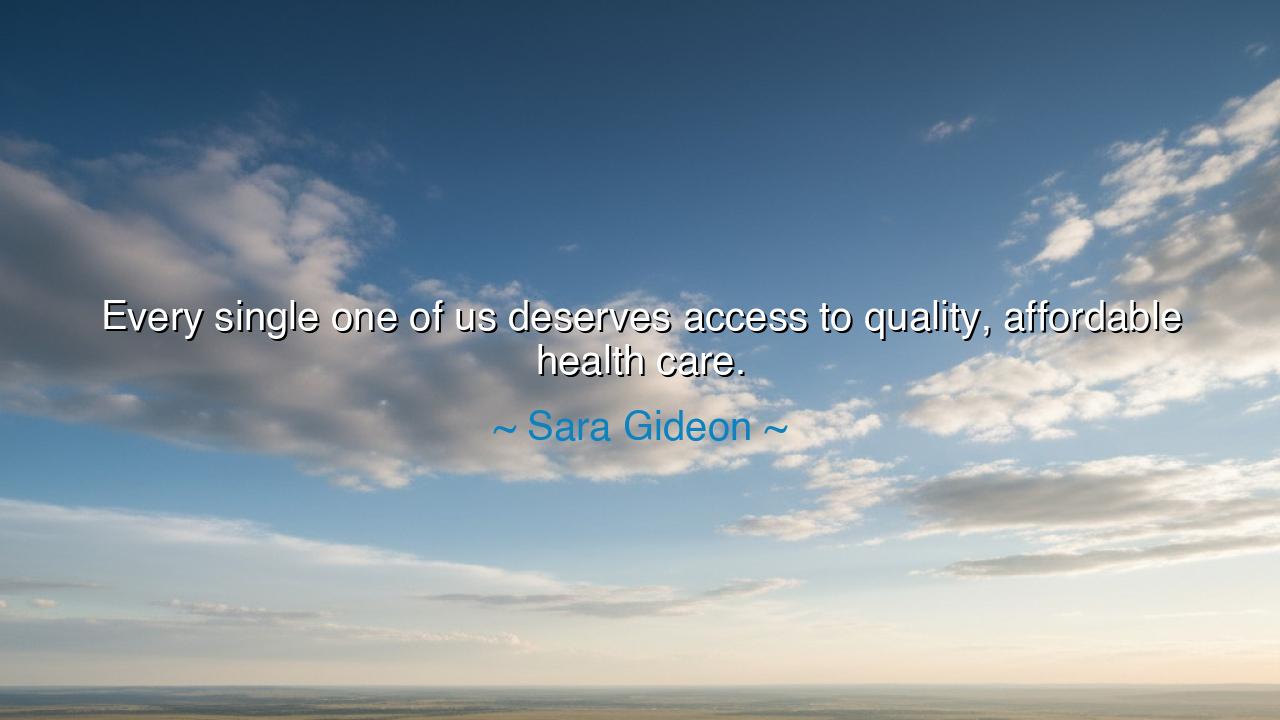
Every single one of us deserves access to quality, affordable






The words of Sara Gideon, “Every single one of us deserves access to quality, affordable health care,” resound not merely as a political statement, but as a moral proclamation. They echo a truth older than any government and deeper than any system—that the care of the sick is the measure of a civilization’s soul. Health is not a luxury to be earned; it is a birthright of every human being. When a society honors this right, it proclaims the sacredness of life itself. When it denies it, it abandons its humanity.
This truth was understood even by the ancients. In the temples of Asclepius, the Greek god of healing, the poor and the wealthy alike lay side by side, seeking recovery under the same roof. In their belief, disease was not only of the flesh, but of imbalance—an ailment of the body and the spirit together. So too does Gideon’s quote remind us that health care is not simply medicine or machinery; it is compassion made manifest, the binding thread between hearts that refuse to let others suffer alone.
History bears witness to those who lived by this principle. In the 1940s, as war ravaged Europe, Dr. Tom Dooley, an American physician, traveled to the poorest corners of Asia—Laos, Vietnam, and Cambodia—carrying little more than a medical bag and immense faith. He tended to the wounded, the forgotten, the hopeless. To him, the worth of a human being did not depend on status or coin. His mission, like Gideon’s vision, declared that no one should be denied care because of where they were born or how much they could pay. In his compassion, one sees the timeless truth: when we heal others, we heal the world.
But Gideon’s words are not only for the halls of government—they are a call to every heart. They remind us that health is the foundation of equality, that freedom is hollow when sickness binds one’s body and poverty denies one’s cure. A mother who cannot afford medicine for her child knows no liberty. A worker too ill to labor knows no dignity. A society that permits such suffering cannot call itself just. To build a fair world, one must begin by ensuring that every breath, every life, has the chance to flourish in wellness.
The origin of this quote lies in Gideon’s belief that the strength of a nation is not measured by its wealth, but by its compassion for the vulnerable. Her words rise from the growing recognition that access to care is not an act of charity—it is an act of justice. Just as water is a necessity for life, so too is medical care a necessity for dignity. In this truth lies a quiet revolution: the understanding that progress is not found in competition, but in collective care.
Health is a sacred trust, and to protect it is a sacred duty. When we build hospitals that serve all, when we support policies that protect the sick, when we volunteer to aid the suffering, we become participants in the oldest and most noble work of humankind: the restoration of life. The ancient healers knew this, and the modern world must remember it.
The lesson, therefore, is clear: treat health care not as privilege, but as principle. Defend it wherever it falters. Offer it where it is denied. Even the smallest act—checking on a neighbor, donating to a clinic, supporting fair health policies—adds strength to the chain of compassion that binds the living together.
And let this truth endure for generations: to care for one is to care for all. In the health of the people lies the health of the world. When every single person, rich or poor, young or old, can receive the care they need without fear or burden, then humanity shall at last stand tall—not as divided tribes, but as one great family, healed by love and guided by justice.






AAdministratorAdministrator
Welcome, honored guests. Please leave a comment, we will respond soon